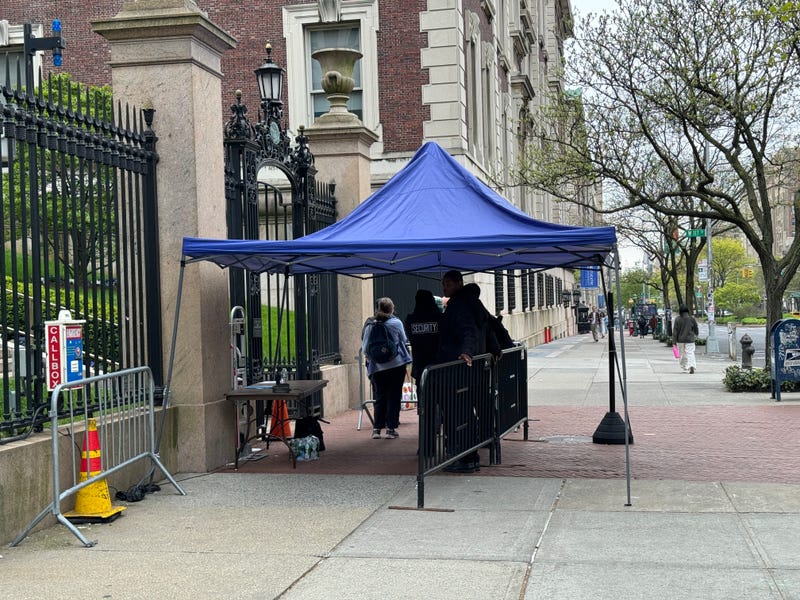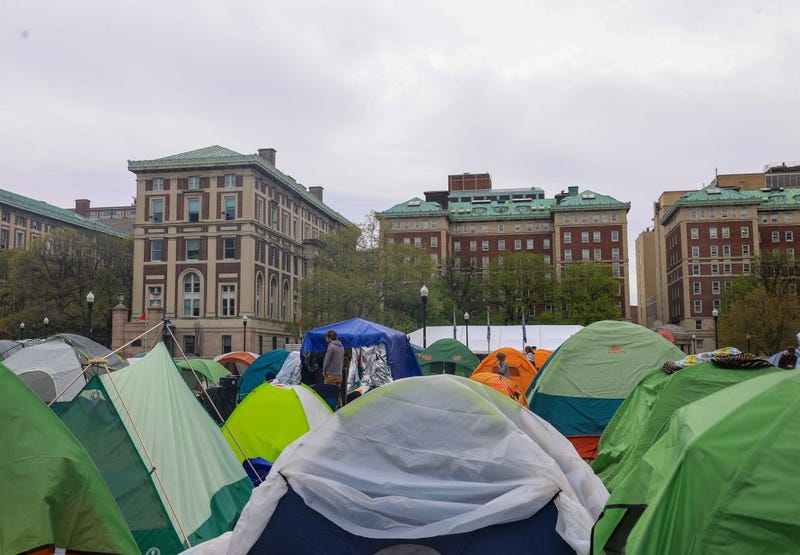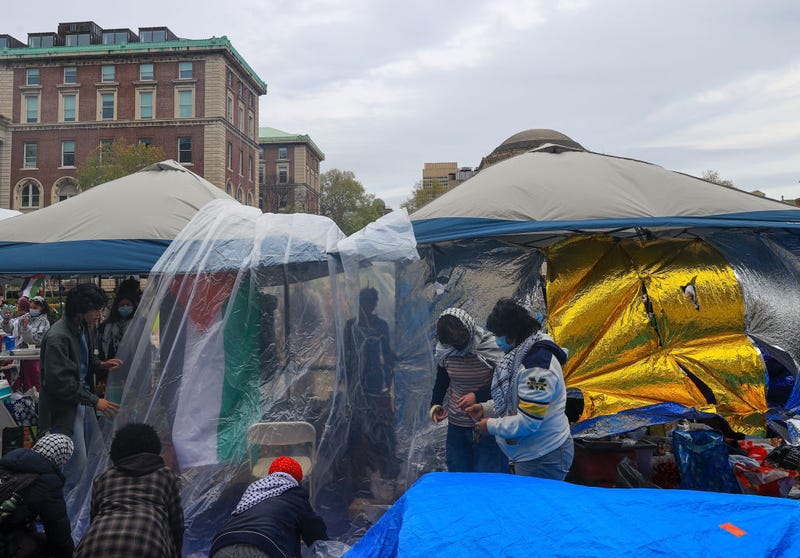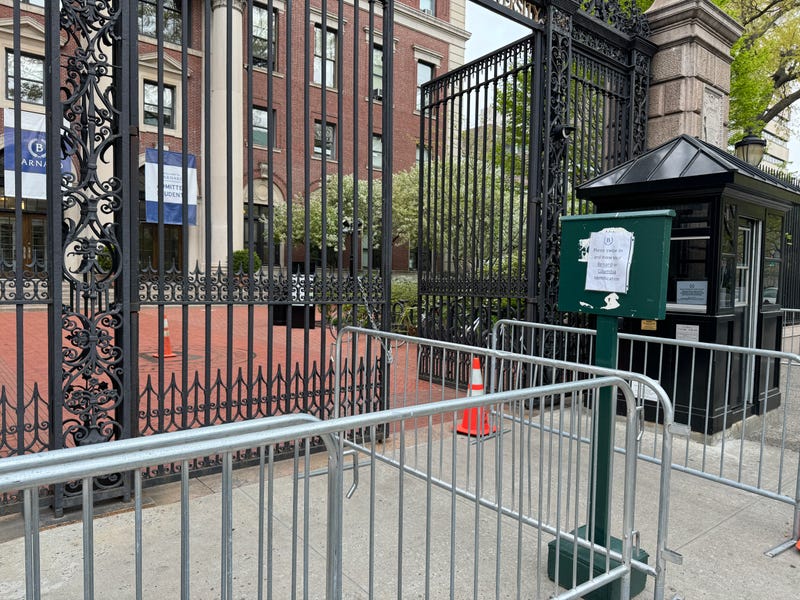
NEW YORK (1010 WINS/WCBS 880) — The pro-Palestinian encampment remained on Columbia University’s lawn on Sunday, and while campus security has ramped up its presence by monitoring school entrances and only allowing those with a university ID on the grounds, administrators have vowed that they wouldn't again involve the NYPD.
Columbia administrators released a statement over the weekend confirming that they would not be asking the NYPD to return to campus after police arrested over 100 demonstrators for trespassing when they refused to leave their collection of tents on April 18.
The encampment quickly returned after it was dispersed, and has sparked similar demonstrations at colleges across New York City and the country. As of now, there has been over a week of negotiations between protestors, who are demanding the university divest from companies doing business with Israel, and administrators, who are trying to maintain a safe, rule-abiding and educational environment.

In a statement signed Friday by board of trustees Co-Chairs David Greenwald and Claire Shipman, Provost Angela Olinto and President Dr. Nemat (Minouche) Shafik, the administration stated that discussions “within [their] community and with outside experts” have committed them to not bringing back police.
“To bring back the NYPD at this time would be counterproductive, further inflaming what is happening on campus, and drawing thousands to our doorstep who would threaten our community,” the statement read.
Mayor Eric Adams, NYPD leaders and campus officials have made it clear that because Columbia is a private institution that sits on private property, police cannot have a presence unless specifically requested by the school’s administration.
“The university thought they could call the police and make the protesters go away. Now we have twice as many protesters,” Joseph Howley, an associate professor at Columbia and supporter of the encampment, told the Associated Press last week. “The students have experienced a ratcheting up of repression that has prompted them to escalate with their own tactics now.”

Student protestors agree that they are being repressed, as evidenced by a federal lawsuit filed against Columbia by several pro-Palestinian demonstrators who claim that they’ve been harassed on campus.
Jewish students at Columbia have also been vocal about feeling unsafe. Organizations like the Columbia Jewish Alumni Association have called for the administration to better protect students, and the university has implemented remote learning and finals options for students concerned about campus tension.
There has been an ongoing national conversation regarding antisemitism on college campuses since the beginning of the Israel-Hamas War following Hamas' attack on southern Israel on Oct. 7, and Shafik was in Washington, D.C. defending her handling of antisemitism at Columbia to Congress when the "Gaza Solidarity Encampment" was erected.
The mayor held his weekly Q&A with press at City Hall on Tuesday, April 23, and claimed that “outside agitators” have had a significant influence on the intensity of campus protests, a sentiment that has been echoed by NYPD leaders.
"There are people who come—have nothing to do with the issue—and they want to aggravate,” Adams said.
Columbia’s statement on Friday reiterated concerns regarding people from outside the campus community becoming involved in demonstrations, especially in light of antisemitism.
“We want to be absolutely clear. The antisemitism being expressed by some individuals is intolerable and the safety situation has become concerning, particularly with the involvement of individuals not associated with Columbia,” the statement read.
Officials also confirmed that the university had banned student Khymani James, one of the encampment leaders, from Columbia.
“Chants, signs, taunts, and social media posts from our own students that mock and threaten to ‘kill’ Jewish people are totally unacceptable,” the statement read. “We can report that one individual whose vile videos have surfaced in recent days is now banned from campus.”
The referenced clip from an Instagram live in January shows James saying that “Zionists don’t deserve to live” and that people should ““Be grateful that [he is not] just going out and murdering Zionists.”
In a statement released by Columbia University Apartheid Divest, the organization that planned and is maintaining the encampment, James apologized for what he said and asserted that he “[affirms] the sanctity of all life” and that “all people deserve to be safe from physical harm.”
“I am frustrated that words I said in an Instagram Live video have become a distraction from the movement for Palestinian liberation. I misspoke in the heat of the moment, for which I apologize,” James said.
Adams and NYPD officials have encouraged campus security at Columbia to keep outsiders away in order to quell unrest.

On Sunday, security from Columbia’s Department of Public Safety were at every entrance checking for university IDs before allowing people on campus. Everyone outside of the campus community, including media professionals, is being kept off the property.
“At the Morningside campus, CUID-only access remains in place until circumstances allow for broader access,” a campus update released Saturday night by Columbia said.
Outside of the campus Sunday morning, 1010 WINS/WCBS 880 spoke with students who said that encampment remains, though it has shrunk in size.
“It had calmed down significantly since when it first started because of the amount of protestors within Columbia reducing a lot,” Pranav, a graduate student, said.
With finals happening and commencements on the horizon, many students were in the library or taking cap and gown pictures.
Despite fears that the school would pause graduation activities due to the volatile campus climate, Saturday’s update confirmed that commencements would be held as planned on May 15.
“Offices across Columbia are working to make sure that all ceremonies run smoothly and that all our students and their families and friends get the celebration they deserve,” the statement said.
“I’m glad at least we get to finish out the school year,” a senior at Columbia told 1010 WINS/WCBS 880.
